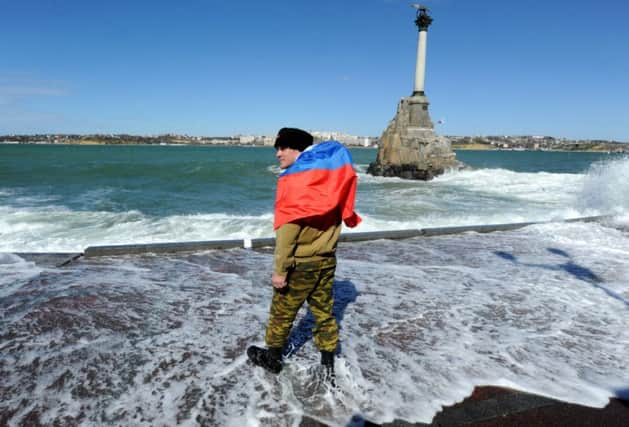Toughest sanctions since the Cold War hit Russia


In the most comprehensive sanctions against Russia since the end of the Cold War, the White House targeted seven senior figures, including advisers to president Vladimir Putin, for their support of Crimea’s vote to secede from Ukraine.
Mr Obama warned that Washington was “ready to impose further sanctions” depending on Russia’s next move in a crisis sparked by the ousting of Ukraine’s pro-Moscow president Viktor Yanukovich last month.
Advertisement
Hide AdAdvertisement
Hide AdThe US sanctions – which also apply to four Ukrainians, including Mr Yanukovich – were announced hours after the EU announced travel bans and asset freezes on 21 people it has linked to the unrest in Crimea.
Those singled out by Brussels include the Crimean prime minister Sergey Valeryevich, commander of the Black Sea Fleet Aleksandr Vitko and the mayor of Sevastopol Aleksei Chaliy.
However, Russian deputy prime minister Dmitry Rogozin, one of those subject to the US sanctions, struck a bullish tone yesterday, claiming that the measures will not affect those without assets abroad.
It comes amid ongoing controversy surrounding Sunday’s Crimea referendum. One senior US official said there was “concrete evidence” that some ballots for the referendum – declared illegal by the US and EU – arrived pre-marked in many cities, with “massive anomalies in the vote”.
Mr Obama warned that continued Russian military intervention in the region would only “further isolate Russia and diminish its place in the world”.
He said: “If Russia continues to interfere in Ukraine, we stand ready to impose further sanctions. Our message will be clear. As Nato allies we have a solemn commitment to our collective defence and we will uphold this commitment.”
The orders freeze any assets in the US and ban seven ranking Russian government officials and four individuals identified as Crimea-based separatist leaders from entering the country.
Those named included two members of Mr Putin’s inner circle: presidential aide Vladislav Surkov and adviser Sergei Glazyev. Two state Duma deputies, Leonid Slutsky and Yelena Mizulina were also targeted.
Advertisement
Hide AdAdvertisement
Hide AdThe White House said its actions sent “a strong message to the Russian government that there are consequences for their actions that violate the sovereignty and territorial integrity of Ukraine, including their actions supporting the illegal referendum for Crimean separation”.
Foreign Secretary William Hague said the EU sanctions represented an “important statement of the unity and resolve on this question”.
He said: “It is possible to add to these measures of course. This is not a list that is set in stone for the future, it is possible to add other figures in future depending on how Russia reacts to the referendum in Crimea.
“We have started today discussing the longer term, the need to reduce European dependence on Russian energy over many years to come.
“It is some of these sorts of things that will be the biggest costs in the long term to Russia if we make no diplomatic progress over the coming weeks.”
Catherine Ashton, the EU’s foreign policy chief, said she hoped there would be a “de- escalation” in the situation which offered the “chance for Ukraine to be a country which has territorial integrity”.
She also said the EU would “provide strong financial support” to ensure Ukraine’s economy is stabilised, as well as giving it help to secure its energy supply.
The turmoil in Ukraine has become Europe’s most severe security crisis in years and tensions have been high since Russian troops seized control of Crimea, a strategic Black Sea peninsula that has now decided to merge with Russia.
Advertisement
Hide AdAdvertisement
Hide AdRussian troops are also massed near the border with Russian-speaking eastern Ukraine.
Ukraine’s acting president, Oleksander Turchinov, raised tensions on the ground by calling for the activation of some 20,000 military reservists and volunteers across the country and for the mobilisation of another 20,000 in the recently formed national guard.
Meanwhile, Royal Air Force Typhoons have been offered to Nato “air policing” efforts in the east of Europe following Russian action in Crimea, Defence Secretary Philip Hammond announced yesterday.
KEY PLAYERS TARGETED BY US AND EU
Rustam Temirgaliev: Deputy chair council of ministers of Crimea
Deniz Berezovskiy: Ukrainian navy commander
Aleksei Chaliy: “Mayor of Sevastopol”
Pyotr Zima: head of Crimean Security Service
Yuriy Zherebtsov: Counsellor of the Speaker, Supreme Council of Ukraine
Sergey Tsekov: Vice Speaker of the Supreme Council of Ukraine
Viktor Ozerov: ussian Federation
Vladimir Dzhabarov: ussian Federation
Andrei Klishas: ussian Federation
Nikolai Ryzhkov: ussian Federation
Evgeni Bushmin: Russian Federation, Deputy Speaker
Aleksandr Totoonov: ussian Federation
Oleg Panteleev: First Deputy Chair, Committee on Parliamentary Issues
Sergei Mironov: Russian State Duma
Sergei Zheleznyak: Deputy Speaker of the State Duma
Leonid Slutski: Chair of the Commonwealth of Independent States
Aleksandr Vitko: Commander of the Black Sea Fleet
Advertisement
Hide AdAdvertisement
Hide AdAnatoliy Sidorov: Commander, Russia’s Western Military District
Aleksandr Galkin: Russia’s Southern Military District, Black Sea fleet comes under his command
Vladislav Surkov: Putin aide
Sergey Glazyev: Putin adviser
Leonid Slutsky: Russian state Duma
Andrei Klishas: ussian Federation
Valentina Matviyenko: Federation Council head
Dmitry Rogozin: Russian Federation deputy prime minister
Yelena Mizulina: Russian state Duma deputy
Viktor Yanukovych: Former Ukrainian president
Viktor Medvedchuk: leader of Crimea separatist group and close friend of Putin
Sergey Aksyonov: rimea’s regional government prime minister
Vladimir Konstantinov: speaker of the Crimean parliament